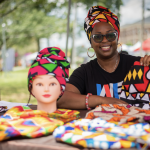By Nicole S. Daniel
The Birmingham Times
Tolu Ojesina’s head wraps and bonnets offer a clear description of who she is and what matches her moods.
“Some patterns are bold and vivid. Others are more subdued. All are beautiful,” said Ojesina, founder and creative director of Moadacrafts, a collection of African-print head wraps and bonnets.
All of her products are handmade by a 25-year-old seamstress in Nigeria, where Ojesina grew up wearing head wraps.
“They are traditional attire for Africans,” said the business owner, who can be found selling her head wraps at events throughout the metro area.
Most recently Ojesina was at this month’s African Heritage Festival at the Birmingham Museum of Art and the Caribbean American Carnival Festival in Bessemer, Ala.
“African and Caribbean festivals are my favorite because I get to connect with Africans from the Diaspora to the Motherland in a very concrete and meaningful way,” she said.
Timeless Fashion
During appearances, Ojesina teaches about various aspects of African culture, such as clothing, food, coming-of-age rituals, traditional wedding ceremonies, and more. She also discusses the origin of African-print fabrics from Kenya, Nigeria, Ghana, and other countries.
Ojesina also provides demonstrations on how to fold the head wraps. Asked about her technique, she said, “Wrapping and tucking is all you’re doing. It takes about 20 seconds average. There are two pieces: one piece is a belt, and the other is bonnet, and that one does not need tying—just wrap and tuck.”
Head wraps have been a timeless fashion trend in the lives of African women for centuries, and their popularity has transcended African culture. Head wraps are classy, and they give an elegant look to a woman’s face, come in a variety of colors, and are very practical. While many may wear them for fashion reasons, head wraps and bonnets have become essential for women of color who choose to wear natural hairstyles.
“When I lived in Boston, [Massachusetts], the cold was something fierce,” said Ojesina, who moved to Birmingham in 2015. “I wear my hair natural, and it began to shed and break. Head wraps were the solution. My natural hair began to thrive.”
Beautiful Childhood
Ojesina, who grew up in the West African nation of Nigeria, is one of four siblings; she is the second child. Early on, her parents instilled the virtues of hard work and integrity into the children. “My family wasn’t rich, but my siblings and I are closely-knit and knew we were loved,” she said, adding that she had a beautiful childhood.
Both of Ojesina’s parents were in the home, but her most vivid memories are of her mother’s voice as she sang while cooking. By the age of 10, she began to cook dinner just so she could sing just like her mother.
Ojesina was a sickly child, and her earliest memories are of hospitals. The visits, though frequent, were pleasant. She would always see a kind pediatrician who was originally from India and who was her primary inspiration for pursuing a career as a physician.
Ojesina earned a medical degree from the University of Lagos in 1998. A few weeks after getting married, her husband enrolled at Harvard for graduate school, and the couple moved to the United States.
In 2008, while Ojesina was still living in Boston, her mother passed away in Nigeria. “She was the most nurturing mother ever,” said Ojesina. “She was an old-school elementary teacher, a strict disciplinarian.”
To honor her mother’s legacy, Ojesina began to design and create authentic African-print fashion accessories, such as sleeping bonnets, head wraps, and bowties, during the height of the COVID-19 pandemic in 2020.
Feel Like a Queen
Moadacrafts head wraps are crafted with colorful cotton African prints on the outside and soft satin on the inside. Wraps can be used to protect a woman’s head from the heat of the sun and can also be used as a protective style for women with natural hair.
Her bonnets are unique because they are designed with wide headbands to ensure edge control, as well as lots of room to comfortably fit over large curls and large protective styles like braids. The bonnets are easy to slip on to protect tresses overnight or to be used as a fashion accessory on a bad hair day. Moadacrafts bonnets are made of 100 percent satin to preserve and retain moisture in the hair while sleeping. Satin has so many great benefits, Ojesina explained, because it protects hair from the dryness caused by friction between hair and moisture-absorbing materials, such as cotton. The material also keeps hair hydrated and reduces breakage, tangles, and thinning.
Head wraps and sleep bonnets play an important role in protecting natural curls, braids, and other styles just as much as other products used in a natural hair-care routine. Besides preserving hairstyles, head wraps and satin bonnets keep much-needed moisture in the hair.
“When I wear my head wraps, I feel like a queen, Nefertiti, and resurrected like the African that I am,” Ojesina said.
To learn more about Moadacrafts head wraps and bonnets, visit the Facebook store at www.facebook.com/Moadacrafts.










